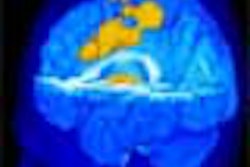Researchers at the Medical College of Wisconsin in Milwaukee are using fMRI to predict which patients undergoing brain surgery to treat epilepsy will develop postoperative language-function problems.
Study leader Dr. Jeffrey R. Binder said the technique uses fMRI to identify language areas in the brain before surgery is performed to remove part of the temporal lobe to stop the seizures from recurring.
Patients in an MRI scanner perform language tests while images are taken. Areas of the brain involved in performing the tests become brighter on the image due to increased blood flow to the area.
If the language areas in the temporal lobe are concentrated on the left side of the brain, the risk of developing language problems after surgery is high, compared to when the language areas are spread equally between the left and right temporal lobes, Binder said.
When language functions are distributed between the temporal lobes, the brain appears to be able to do without the left side, using the unoperated right side to compensate, he added. But when language functions are concentrated on the left, there is less reserve capacity with which the brain can compensate after the left side is removed.
Temporal-lobe seizures are the most common type of epilepsy. As many as 50% of patients develop mild language problems when the surgery involves the left temporal lobe. Surgery on the right side rarely causes any decline in language, so the study focused on patients with left-sided surgery, said Binder, a professor of neurology at the college.
"That's why measuring the location of language functions before surgery can predict how the patient will fare," Binder said.
The finding, published in the June issue of Neurology, was the result of research that involved scanning more than 60 patients with temporal-lobe seizures.
By AuntMinnie.com staff writersJuly 15, 2003
Related Reading
MRI reveals how reading skills mature, June 30, 2003
M is for MRI: Functional imaging spells out ABCs of dyslexia, April 25, 2003
Amnesiacs retain some memories, according to MR studies, April 4, 2003
Copyright © 2003 AuntMinnie.com




















